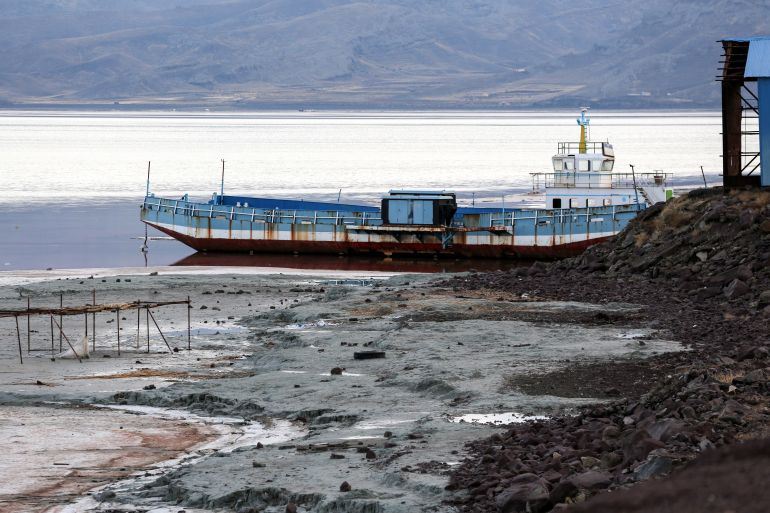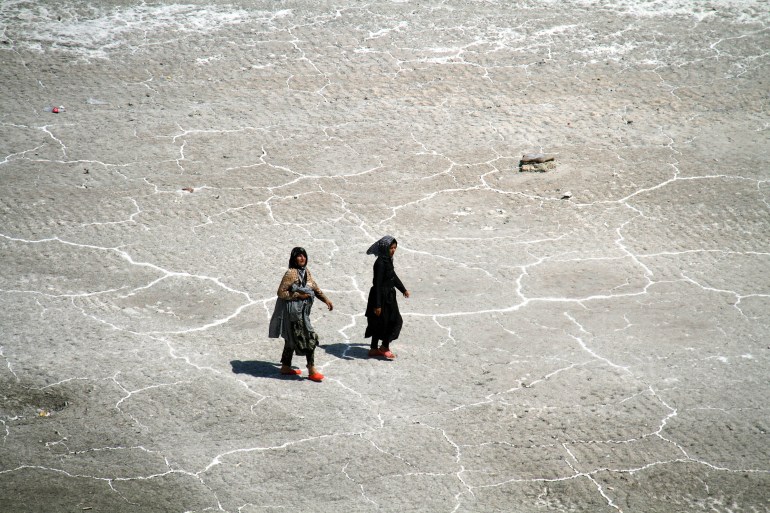Iran’s climate efforts derided as MENA nations take action
Critics lament nonexistent government measures on climate change as iconic lakes such as Urmia in northwest Iran disappear.

An Iranian man laments the damage done to Iran’s physical landscape as he goes on his daily jog through Tehran.
There was a long river close to his house that used to be filled with water just a few years ago. Now the riverbed is completely dry and covered in rubbish instead.
Keep reading
list of 4 itemsClimate artefacts: How Nazi warships resurfaced in the Danube
How US climate lawsuits could hold Big Oil accountable
Tax oil firms to pay for climate damage, island nations say
“There is no water in it, no clean air around it, and there are no leaves left on the trees to give this once picturesque river the shade it needs to stay cool,” said the 30-year-old male from the capital, who asked not to be named fearing reprisal from authorities.
“We want to live a healthy life and the basis for that is to have a healthy environment surrounding us.”
What happened to the river is not an isolated incident. Lake Urmia in northwestern Iran, once the Middle East’s largest lake, is now almost completely dried up.
The cause: decades of poor management that has been exacerbated by climate change.
Iran is the world’s sixth-highest greenhouse gas emitter and one of the only countries that has not ratified the 2015 Paris Agreement, a treaty that if signed symbolises a nation’s commitment towards curbing climate change.
World leaders are currently meeting at the COP27 UN climate talks in Sharm el-Sheikh, Egypt, and Ali Salajegheh, the head of Iran’s environment agency, is attending.
But analysts say they anticipate Iran’s contribution to global efforts aimed at combating planetary warming to be a let-down.
“There wasn’t any tangible response or information from Iran regarding climate change at COP26 in Glasgow. I’m afraid to say that this year will probably be the same,” said Mohammed Mahmoud, the director of the climate and water programme and senior fellow at the Middle East Institute.

Mahmoud told Al Jazeera other countries in the Middle East and North Africa region are making concerted efforts to deal with climate change going forward. And even though “their claims may be aspirational rather than factual, at least there is that. With Iran there isn’t even that”.
Saudi Arabia, the United Arab Emirates (UAE), and Turkey, for example, have announced their carbon neutrality by about the middle of the century. Even the UAE is hosting COP28 next year.
Iran’s decision-makers, on the other hand, have shown no willingness towards greenhouse gas mitigation efforts.
In July, the United Nations General Assembly passed a motion declaring that access to a clean and healthy environment is a “universal human right”. One hundred and sixty-one nations voted in favour of the resolution, while eight abstained.
The Islamic Republic was among the list of nations that voted against it – together with Russia and China, also big contributors of global hydrocarbon emissions.
Iranian officials have acknowledged worsening environmental issues, particularly increasing water scarcity. President Ebrahim Raisi has ordered officials to work on plans, saying last year “there are problems but there are also solutions, we’re not at a dead end”.
But with American sanctions devastating the economy and industry driven by fossil fuels, it remains unclear what manoeuvres the government can take.
🎥 رئیسجمهور: مشکلات وجود دارند اما هرچه بیشتر پیش میرویم به این پی میبریم که برای همه مشکلات راه برون رفت وجود دارد
ما با #خشکسالی و کمبود نزولات آسمانی مواجه هستیم اما در کنار دعا برنامه هم برای آن باید داشته باشیم pic.twitter.com/nBsPncxABY
— خبرگزاری تسنیم 🇮🇷 (@Tasnimnews_Fa) December 5, 2021
According to the latest emissions gap report by the UN Environment Programme, pledges made by countries since COP26 last November are far from what is needed to keep climate change from unleashing its full wrath on the planet.
To avoid that scenario, global emissions must be cut by 45 percent by 2030.
But not all countries will act the same and “we can’t expect the systems that have no respect for human rights today to care about climate change and environmental preservation, and the rights of future generations”, said Kaveh Madani, the former deputy chief of Iran’s department of environment and its lead negotiator at COP23 at the 2017 Bonn climate summit.
He highlighted months of protests in Iran after the death in police custody of Mahsa Amini, 22, who was arrested for not properly wearing a headscarf.
Madani, who will be the next director of the United Nations University Institute for Water, Environment and Health starting next year, noted how difficult it is for young Iranians to press the government into climate action.
“While in many countries peacefully fighting for the future health of our planet is a given right afforded to the young generation, it is a tragedy that in Iran our children and youth are getting killed on the streets and in schools because they are asking for their most basic rights to be met,” he said.
Over the past year, multiple Iranian provinces have been hit with more frequent and severe dust storms, floods, droughts, heatwaves, and water shortages.
On June 29, the country recorded the hottest day in its history when temperatures soared to 53.7 Celsius (128.7 Fahrenheit) in the southwestern city of Ahvaz, capital of Khuzestan province.
To put it in context, 56.6C (134F) is the highest temperature documented on earth in California in 1913.
Still, leaders have made no plans to address Iran’s environmental woes. Last year at COP26, Iran’s department of environment said sanctions placed on its economy by the Unites States were the reason it has not committed to the global fight against climate change.
“I have come to believe that unfortunately some senior members of the Iranian system see the Paris Agreement as a Western conspiracy, something not to be trusted or invested in,” said Gary Lewis, a former policy director for the UN Environment Programme and UN resident coordinator in Iran between 2013 and 2018.
In 2018, the intelligence arm of the Islamic Revolutionary Guard Corps carried out a wave of arrests of Iranian environmental advocates, accusing them of espionage and collaboration with “enemy states”. Seven activists remain in jail serving sentences as long as 10 years.
With Iran’s high exposure and vulnerability to climate change, Lewis said he worries about the number of talented scientists available to guide the government.
As young Iranians take to the streets to demand basic rights, the 30-year-old man from Tehran questioned whether the government will ever act on the climate crisis.
“The people who rule our country will never understand that we are entitled to live in an environment that is not polluted, waterless, or wretchedly hot,” he said. “They just don’t get that and the only thing they care about is staying in power.”